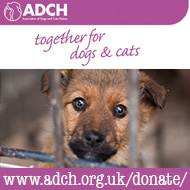ADCH launches emergency fund for rescue organisations

The fund will provide one-off grants of up to £10,000.
An emergency fund to support animal rescue organisations affected by COVID-19 has been launched by the Association of Dogs and Cats Homes (ADCH).
The fund will provide one-off grants of up to £10,000 to cover activities directly affected by the pandemic to support the cost of food, bedding, cleaning equipment and transportation of animals.
The move comes in response to new figures that show 100 per cent of UK companion animal rescue organisations have seen their income fall since the start of the pandemic.
More than half of respondents to the ADCH's survey of rescue and re-homing organisations said they had seen a 50 per cent fall in their fundraising income. Some 61 per cent also said they have reduced staff numbers, the majority through the government's furlough scheme.
Furthermore, 52 per cent of respondents said they had three months of income and reserves remaining, while 32 per cent had less than three months, and some significantly less than this.
“There are over 1,200 animal rescue and rehoming centres throughout the UK, doing their very best to care for hundreds of thousands of unwanted and abandoned animals each year,” commented Claire Horton, ADCH chairman. “Their closure or reduction in capacity would be catastrophic for animals in need but the results of the ADCH survey paint a very worrying picture.
“There has been no let-up in the number of animals these rescues care for, yet their income streams have all but dried up due to cancelled fundraising activities and closure of charity shops," she continued. "This is an emergency – the very survival of some of these rescues is at stake."
Grants will be prioritised for organisations with an annual turnover of £500,000 or less. In addition to food and equipment, they will also support additional staff costs as a result of staff and volunteers not being able to attend the rescue or shelter.
“Wide-scale pet abandonment could be one big consequence of the coronavirus pandemic if owners struggle to care for their pets financially or can’t cope with them after lockdown," adds Claire. "We hope this fund will prevent animal rescue centres from being forced to close their gates and therefore safeguard the welfare of those animals in most urgent need.”
To donate to the ADCH Coronavirus Emergency Fund can visit adch.org.uk/donate



 The RCVS has announced a new version of its 1CPD mobile app, with enhanced features for veterinary surgeons and veterinary nurses to record their continuing professional development.
The RCVS has announced a new version of its 1CPD mobile app, with enhanced features for veterinary surgeons and veterinary nurses to record their continuing professional development.